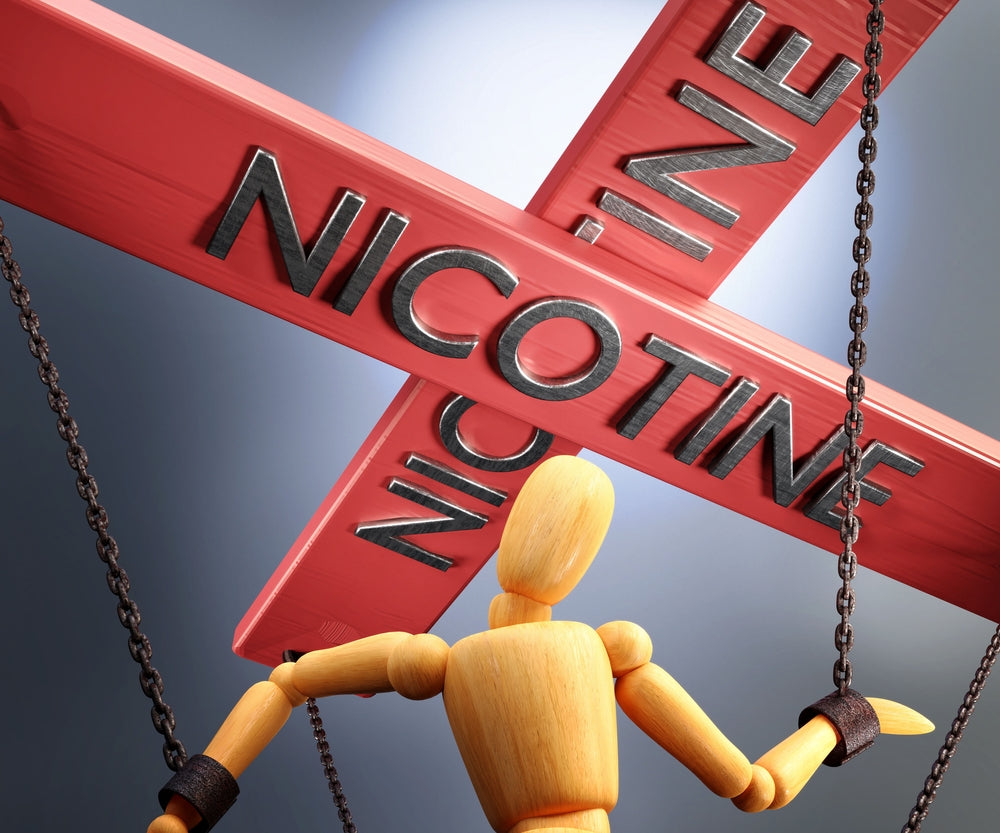It is widely understood in the 21st Century that nicotine is a highly addictive substance. In fact, it is one of the most addictive substances known to man, being scientifically accepted as harder to overcome than heroin in many cases.
As a stimulant, nicotine is a part of the family of drugs considered to be among the most habit-forming. Delivering short-term benefits to a person’s mood and sense of wellbeing, while simultaneously creating conditions to the contrary; a person may smoke to relieve stress, without realising the withdrawal effects of nicotine are actually driving them to smoke in the first place.
There have been a massive number of studies carried out investigating the addictive nature of nicotine, with scientists constantly amazed by how powerful it can be. One researcher, Dr Daniel McGehee, stated that “it would be difficult to design a better drug than nicotine to promote addiction”.
As either smokers or vapers, we must accept that nicotine has become a part of our lives. If we decide we want to change that and move away from nicotine, then understanding how it effects our body and mind, so we can properly prepare for that journey can be very useful.
Why is Nicotine So Addictive?
The National Institute for Drug Abuse (NIDA) funded research at the University of Chicago, which found that a major part of nicotine’s addictiveness lies in its double action upon the brain. It directly stimulates the feelings of pleasure in the brain, while indirectly prevents those feelings from lasting very long or coming on very strong.
In this way nicotine toys with your brains reward system, causing you to crave the satisfaction of a cigarette for example, while chemically ensuring the joy will be short-lived, leading you to consume more and more in pursuit of a dwindling pleasure.
Once it reaches your brain, nicotine binds to special neurons and causes them to produce the neurotransmitter Dopamine. Dopamine is not only responsible for feelings of pleasure, but also drives our desire to repeat behaviours that led to that pleasure.
For example, drinking water when thirsty is a universal example of this action-reward relationship. When we drink to quench our thirst, our brains are flooded with dopamine which gives us satisfaction and reinforces that this was the correct response to our situation, making us want to do it again if the same circumstances arise.
Nicotine takes this relationship to the next level, which is why it is so powerfully addictive. NIDA discovered that dopamine levels triggered by nicotine remain high even after the direct stimulus (smoking, for example) ends. This means that the desire to repeat behaviour like smoking is even stronger than natural causes like drinking water.
This occurs because of the way nicotine interacts with two other neurotransmitters in your brain: glutamate and GABA. Glutamate speeds up the activity of your brain’s neurons, whereas GABA slows them down.
Researchers discovered that nicotine specifically causes glutamate to massively speed up the release of dopamine, while at the same time preventing GABA from slowing it down naturally. This results in a dopamine hit that can last over an hour, and results in an immensely powerful desire to repeat the behaviour that led to such a boost – an addiction.
Summarising the findings, Dr McGehee said:
“A brief application of nicotine can induce a lasting effect on excitatory [glutamate] signals to the brain’s reward system.”
“This suggests that in humans a relatively short nicotine exposure, even for someone who has never smoked before, can cause long-lasting changes in excitatory neurotransmission.”
“The combination of effects-increasing dopamine release and decreasing the inhibitory [GABA] response - results in an amplification of the rewarding properties of nicotine, it would be difficult to design a better drug to promote addiction.”
Nicotine Damage and Withdrawal
Nicotine has a profound effect on the brain and body, with prolonged exposure at different points in our development having varied consequences. The power of the dependence caused by nicotine addiction alone means that those attempting to leave it behind can expect to face a number of different withdrawal symptoms both physical and mental in nature.
What is the Physical Impact of Nicotine?
Because nicotine acts on so many parts of the body, it can cause widespread damage if consumed regularly and in large amounts. NIH research has found prolonged exposure can damage the heart, kidneys, liver and beyond. Despite the current findings however, research is still ongoing to establish the true risks associated with Nicotine. Studies observing NRT use in patients who were smokers with heart disease found that, when stopping tobacco use completely and using only NRT, the risks of death or hospitalisation were greatly reduced in all patients.
It was also found to reduce a person’s natural immune response and increase their risk of respiratory and cardiovascular disorders, let alone the negative impacts on reproductive health. Worse still, a significant number of studies also linked nicotine to cancer, which is unsurprising given the known risks of smoking – however the majority of this risk comes from the additional chemicals in cigarette smoke, rather than nicotine by itself.
Nicotine when isolated and in the quantities most people would normally consume is actually a well-tolerated substance. While links to cancer exist, they are not well substantiated. Modern experts theorise that Nicotine is no more likely to cause cancer than caffeine. Studies in human trials have struggled to prove that nicotine (exclusively) causes increased risk of cancer. It is believed the delivery method and the additional chemicals consumed while using them carries the greater risk, such as those in cigarettes and to a lesser extent, vaping.
While NRT’s only deliver small amounts of nicotine even they can pose a risk, with tobacco posing the greatest risk of not only physical harm but of forming addiction. Long-term use can lead to any number of the above issues developing. Even in the slightest cases, nicotine withdrawal can lead to headaches and fatigue.
Studies have shown that nicotine use increases the heart rate from 10-15 beats per minute, and slightly elevates blood pressure. It has been shown to have diuretic effects on the body, meaning you are more likely to be dehydrated while using it.
Physical Withdrawal Symptoms
Appetite: Within a day or so of your last cigarette, your appetite will shoot up for a while. Nicotine binds to receptors in the brain which release dopamine and serotonin. These two chemicals reduce hunger, so when they’re out of your system you’ll want to eat more. A lot of people also find that they eat to fill the time they used to spend smoking. Most people gain about 5 to 10 pounds as they try to quit smoking.
Cravings: Nicotine cravings are the symptom you will deal with the longest, and they could start just 30 minutes after your last cigarette. An average craving will last only about 15 to 20 minutes, but they are persistent.
Headaches and dizziness: These are usually mild and are often the first withdrawal symptom to show up and taper off.
Fatigue: Nicotine is a stimulant, so you’ll probably feel tired without it. You may also be restless and might have insomnia.
Constipation: For the first month of abstaining from nicotine, constipation can be another unpleasant side effect.
What is the Mental Impact of Nicotine Addiction?
Nicotine addiction has a prolific impact on a person’s mental health. The most obvious symptoms of withdrawal include irritability and increased anxiety when cravings reach their peak. This can have negative effects upon not only your wellbeing and ability to cope with daily life, but also your relationships with those around you.
The majority of smokers pick up the habit during adolescence, with 70% reporting to have smoked a cigarette at least once according to the National Institute for Health (NIH). During this time, the prefrontal cortex is still developing. This is the area of the brain responsible for executive functions and attention performance, and it is particularly susceptible to damage from nicotine consumption. The risk of developing psychiatric disorders and mental health issues later in life has been observed to greatly increase if the person was a smoker in their adolescence.
Mental Withdrawal Symptoms
Anxiety: The nicotine delivered when smoking is widely perceived to relieve stress, when quitting this can cause your anxiety to skyrocket as you are defying your brains desire to repeat the behaviour that gave you such a powerful chemical reward.
Depression: For the same reasons as anxiety above, suddenly removing nicotine from your life can lead to feelings of depression. While these are generally gone within a month, those with a history of medical anxiety and depression may require extra support.
Irritability: As a result of the physical symptoms of withdrawal, it is common for a person to have a very short fuse. This can cause you to become angry at the slightest thing, however this is normal and should pass with time.
Mental Fog: As the nicotine slowly leaves your body, many people have expressed a difficulty concentrating and remaining focussed on everyday tasks.
Timeline of Nicotine Addiction
30 minutes to 4 hours: The initial effects from the nicotine will wear off and you’ll start to crave another cigarette.
10 hours: You will be very restless, physically craving a cigarette, and wondering how to fill the time. You may feel sad and hopeless.
24 hours: Irritability will kick in and your appetite will increase.
2 days: You’ll likely have headaches as the nicotine leaves your system.
3 days: The nicotine should be gone from your system at this point. Your cravings should taper off but anxiety may start to rise.
1 week: Pat yourself on the back, you’ve made it through the worst. Avoiding triggers is vital to avoid relapse.
2 to 4 weeks: You still won’t have much energy, but any mental fog should be clearing, and your appetite will settle down. Your cough, depression, and anxiety should also improve.
5 weeks on: With most physical symptoms behind you, the key is now remaining strong mentally.
Are You Worried About Your Nicotine Consumption?
If you are a smoker looking for an alternative or a new vaper who wants to work their way down through nicotine strengths, there are multiple resources available to support you – head over to our Switch With EDGE area to find out more. Or to learn more about the history of nicotine and how we absorb it, check out the EDGE Best Practice Series: What is Nicotine?
Our Sources:
https://www.ncbi.nlm.nih.gov/pmc/articles/PMC2953858/
https://www.ncbi.nlm.nih.gov/pmc/articles/PMC3543069/
https://www.ncbi.nlm.nih.gov/pmc/articles/PMC4363846/
https://www.nhs.uk/live-well/quit-smoking/stopping-smoking-mental-health-benefits/



